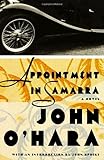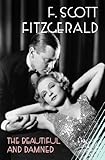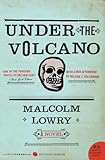 For no reason at all, I always thought this book was about horses and cavalry officers. (This is a good example of why, when you ask me a question and I answer, you should be careful to ascertain whether I know the answer, or if it’s just a feeling I have. Especially when I am giving you directions.) So, this novel, which I never wanted to read because I thought it was about horses, piqued my interest when I saw it mentioned in conjunction with Revolutionary Road (which I’ve yet to read) and forgotten novels about men feeling sad even though they have a lot of nice items in their homes. Because, rather than horses, that’s what Appointment in Samarra is about. It is about the nameless malaise of the moneyed man of the modern era – the madness which no Cadillac can assuage. And it’s about alcoholism. Two of your popular literary themes, really.
For no reason at all, I always thought this book was about horses and cavalry officers. (This is a good example of why, when you ask me a question and I answer, you should be careful to ascertain whether I know the answer, or if it’s just a feeling I have. Especially when I am giving you directions.) So, this novel, which I never wanted to read because I thought it was about horses, piqued my interest when I saw it mentioned in conjunction with Revolutionary Road (which I’ve yet to read) and forgotten novels about men feeling sad even though they have a lot of nice items in their homes. Because, rather than horses, that’s what Appointment in Samarra is about. It is about the nameless malaise of the moneyed man of the modern era – the madness which no Cadillac can assuage. And it’s about alcoholism. Two of your popular literary themes, really.
 So I read it, and it’s great. It’s like a lewd version of The Beautiful and Damned, but set in Pennsylvania, where people are slightly less fancy. The novel centers around Julian English, a cash-poor upper-cruster, who runs a Cadillac dealership. (Fitzgerald upper-crusters are too posh to even have jobs, let alone jobs in the automotive industry.) Julian drinks to excess with great frequency, and one day he throws a drink in a man’s face at the club, because the man is rich and fat and Irish Catholic and just de trop, somehow. And even though everyone in Gibbsville, PA is always doing grotesque drunken things at the club, this is for some reason the limit, and society begins to close ranks against Julian. After that, things go to complete shit very quickly. Julian, through desperation or madness or sheer orneriness, continues to behave badly, digging himself deeper with his peers and his wife, all the while drinking enough to kill an ox. At the end of the novel, his demise (figurative or literal, take your pick) is so inevitable it’s not even a spoiler. The title, taken from the epigraph, taken from Maugham, tells all.
So I read it, and it’s great. It’s like a lewd version of The Beautiful and Damned, but set in Pennsylvania, where people are slightly less fancy. The novel centers around Julian English, a cash-poor upper-cruster, who runs a Cadillac dealership. (Fitzgerald upper-crusters are too posh to even have jobs, let alone jobs in the automotive industry.) Julian drinks to excess with great frequency, and one day he throws a drink in a man’s face at the club, because the man is rich and fat and Irish Catholic and just de trop, somehow. And even though everyone in Gibbsville, PA is always doing grotesque drunken things at the club, this is for some reason the limit, and society begins to close ranks against Julian. After that, things go to complete shit very quickly. Julian, through desperation or madness or sheer orneriness, continues to behave badly, digging himself deeper with his peers and his wife, all the while drinking enough to kill an ox. At the end of the novel, his demise (figurative or literal, take your pick) is so inevitable it’s not even a spoiler. The title, taken from the epigraph, taken from Maugham, tells all.
Two things struck me about this book. One, it’s very spicy. I would imagine that it made an absolute scene upon its publication. The story talks a lot about all the fooling around that Julian and his wife Caroline did before they got married, and the romps they have after. It also talks about drunken foursomes, college girls “going the limit,” Parisian sex shows, men exposing themselves to helpless females, and “experienced” lady reporters. It’s the antidote to talking about the good old days when people cherished modesty.
 Secondly, and I’m sure I’m not the first person to make this comparison, in addition to having obvious similarities with Fitzgerald (the man and the work), Appointment in Samarra is like a depression-era, mid-atlantic precursor to Under the Volcano. Not in its scope; Appointment in Samarra is a crude, meaningless sketch compared to the insanely complex (although perhaps equally meaningless) cosmologies that Malcolm Lowry wove together around Geoffrey Firmin. But the core of each novel is similar – the last day (or three) in the life of a man who is doomed. Each man (educated, posh), should be able to take himself in hand and pull himself together and stop drinking and stop perpetrating pointless cruelties on their respective wives, but they can’t, and they don’t, and you know they won’t from the first. They share the same fatal trajectory. But while Appointment in Samarra is easier and more fun to read, I thought Under the Volcano was sadder and better (so did the Modern Library, it seems); Firmin feels like a more real character, maybe because he was more of Lowry than English was of O’Hara. Or maybe because Lowry, a doomed, disastrous virtuoso, pulled himself together for one monumental achievement, while O’Hara, who sounds like a more garden-variety pain in the ass, managed to spread his talent out over a longer career. That’s just a feeling I have, though.
Secondly, and I’m sure I’m not the first person to make this comparison, in addition to having obvious similarities with Fitzgerald (the man and the work), Appointment in Samarra is like a depression-era, mid-atlantic precursor to Under the Volcano. Not in its scope; Appointment in Samarra is a crude, meaningless sketch compared to the insanely complex (although perhaps equally meaningless) cosmologies that Malcolm Lowry wove together around Geoffrey Firmin. But the core of each novel is similar – the last day (or three) in the life of a man who is doomed. Each man (educated, posh), should be able to take himself in hand and pull himself together and stop drinking and stop perpetrating pointless cruelties on their respective wives, but they can’t, and they don’t, and you know they won’t from the first. They share the same fatal trajectory. But while Appointment in Samarra is easier and more fun to read, I thought Under the Volcano was sadder and better (so did the Modern Library, it seems); Firmin feels like a more real character, maybe because he was more of Lowry than English was of O’Hara. Or maybe because Lowry, a doomed, disastrous virtuoso, pulled himself together for one monumental achievement, while O’Hara, who sounds like a more garden-variety pain in the ass, managed to spread his talent out over a longer career. That’s just a feeling I have, though.









